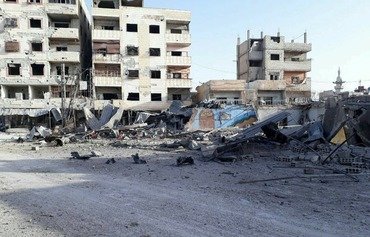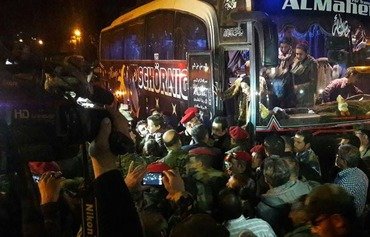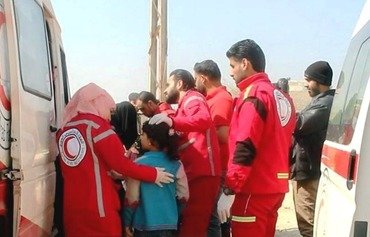Opposition fighters and civilians on Sunday (April 1st) began evacuating the last pocket of Eastern Ghouta after reaching an agreement to leave the enclave outside Damascus, local activists told Diyaruna.
The first group of Failaq al-Rahman fighters left the Eastern Ghouta city of Douma on Sunday for Idlib province in northern Syria after reaching an evacuation agreement brokered by regime ally Russia.
Under a separate agreement, Jaish al-Islam elements and civilians who wish to leave will be evacuated to the city of Jarablus in Aleppo province in northern Syria near the border with Turkey.
"A group of civilians, Failaq al-Rahman fighters and their families left Douma for Idlib province on Sunday," local activist Mohammed al-Beik told Diyaruna.
![A bulldozer removes rubble from a main street in the Eastern Ghouta city of Douma in rural Damascus. [Photo courtesy of Mohammed al-Beik]](/cnmi_di/images/2018/04/02/12098-Syria-Ghouta-bulldozer-600_384.jpg)
A bulldozer removes rubble from a main street in the Eastern Ghouta city of Douma in rural Damascus. [Photo courtesy of Mohammed al-Beik]
They were accompanied by a large number of wounded or sick individuals who opted to be evacuated to the northern region, he said, noting that this batch of evacuees was the largest to leave the city.
Meanwhile, a committee comprising Douma residents and Jaish al-Islam elements who had been tasked with negotiating with the Syrian regime said an agreement had been reached to resolve the situation in the city.
"It was agreed that opposition fighters would leave the city for Jarablus, accompanied by their families and a large number of media activists, rescue workers and civilians who refuse to remain in the city when the regime enters it," he said.
Negotiating an agreement
According to members of the negotiating committee, al-Beik said, the delay in reaching an agreement on Douma was due to some complications.
"The first sticking point was where to send Jaish al-Islam elements, as it is impossible for them to leave for Idlib like the other factions," he said.
The Jarablus region was deemed an appropriate destination.
Another complication involved providing guarantees for the safety of civilians and the fate of those wanted by the Syrian regime for mandatory military duty, he said.
The safety of the civilians was guaranteed by Russia, one of the countries sponsoring the agreement, and the mandatory military duty was delayed for a year to give the youth an opportunity to get their affairs in order, he said.
It also was agreed that the status of opposition fighters willing to lay down their arms would be settled, al-Beik said.
"The first step consists of Jaish al-Islam handing over its medium and heavy weapons in conjunction with the entry of monitoring forces from the countries sponsoring the agreement to ensure the safety of the city and civilians," he said.
Syrian forces have retaken 95% of Eastern Ghouta since launching a blistering air and ground assault on the besieged enclave on February 18th, killing 1,600 civilians and displacing tens of thousands more.
Before February 18th, some 400,000 people in Eastern Ghouta had lived under regime siege for five years, facing severe food and medicine shortages.
In the past few weeks, Russia-brokered evacuation deals have seen more than 46,000 people -- fighters and civilians -- board buses with scant belongings to be driven to the north-western province of Idlib, which is largely outside government control.

![Civilians walk through the Eastern Ghouta city of Douma after an agreement was reached with the Syrian regime for opposition fighters and civilians to leave the city. [Photo courtesy of Mohammed al-Beik]](/cnmi_di/images/2018/04/02/12096-Syria-Douma-damage-600_384.jpg)






